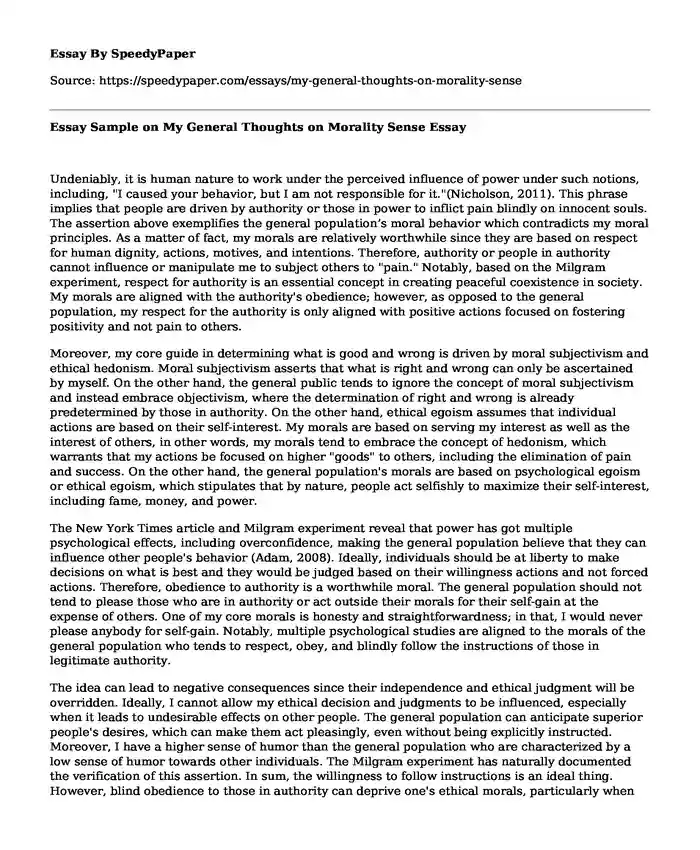
| Type of paper: | Essay |
| Categories: | Personality Human behavior Ethical dilemma Emotional intelligence |
| Pages: | 3 |
| Wordcount: | 609 words |
Undeniably, it is human nature to work under the perceived influence of power under such notions, including, "I caused your behavior, but I am not responsible for it."(Nicholson, 2011). This phrase implies that people are driven by authority or those in power to inflict pain blindly on innocent souls. The assertion above exemplifies the general population’s moral behavior which contradicts my moral principles. As a matter of fact, my morals are relatively worthwhile since they are based on respect for human dignity, actions, motives, and intentions. Therefore, authority or people in authority cannot influence or manipulate me to subject others to "pain." Notably, based on the Milgram experiment, respect for authority is an essential concept in creating peaceful coexistence in society. My morals are aligned with the authority's obedience; however, as opposed to the general population, my respect for the authority is only aligned with positive actions focused on fostering positivity and not pain to others.
Moreover, my core guide in determining what is good and wrong is driven by moral subjectivism and ethical hedonism. Moral subjectivism asserts that what is right and wrong can only be ascertained by myself. On the other hand, the general public tends to ignore the concept of moral subjectivism and instead embrace objectivism, where the determination of right and wrong is already predetermined by those in authority. On the other hand, ethical egoism assumes that individual actions are based on their self-interest. My morals are based on serving my interest as well as the interest of others, in other words, my morals tend to embrace the concept of hedonism, which warrants that my actions be focused on higher "goods" to others, including the elimination of pain and success. On the other hand, the general population's morals are based on psychological egoism or ethical egoism, which stipulates that by nature, people act selfishly to maximize their self-interest, including fame, money, and power.
The New York Times article and Milgram experiment reveal that power has got multiple psychological effects, including overconfidence, making the general population believe that they can influence other people's behavior (Adam, 2008). Ideally, individuals should be at liberty to make decisions on what is best and they would be judged based on their willingness actions and not forced actions. Therefore, obedience to authority is a worthwhile moral. The general population should not tend to please those who are in authority or act outside their morals for their self-gain at the expense of others. One of my core morals is honesty and straightforwardness; in that, I would never please anybody for self-gain. Notably, multiple psychological studies are aligned to the morals of the general population who tends to respect, obey, and blindly follow the instructions of those in legitimate authority.
The idea can lead to negative consequences since their independence and ethical judgment will be overridden. Ideally, I cannot allow my ethical decision and judgments to be influenced, especially when it leads to undesirable effects on other people. The general population can anticipate superior people's desires, which can make them act pleasingly, even without being explicitly instructed. Moreover, I have a higher sense of humor than the general population who are characterized by a low sense of humor towards other individuals. The Milgram experiment has naturally documented the verification of this assertion. In sum, the willingness to follow instructions is an ideal thing. However, blind obedience to those in authority can deprive one's ethical morals, particularly when those in authority lack ethical conviction.
References
Adam Cohen (Dec. 28, 2008) https://www.nytimes.com/2008/12/29/opinion/29mon3.html?_r=0
Nicholson, I. (2011). Torture at Yale”: Experimental subjects, laboratory torment and the “rehabilitation” of Milgram’s “Obedience to Authority. Theory & Psychology, 21(6), 737-761.
Cite this page
Essay Sample on My General Thoughts on Morality Sense. (2023, Aug 10). Retrieved from https://speedypaper.net/essays/my-general-thoughts-on-morality-sense
Request Removal
If you are the original author of this essay and no longer wish to have it published on the SpeedyPaper website, please click below to request its removal:
- Essay Example on the Ohio Women's Bar Association Law
- Free Essay: Why Do Some Protests Remain Peaceful While Others Become Violent?
- Essay Sample on Understanding Consumer and Business Buyer Behaviour
- Essay Sample on The Wilsonian Movement
- Free Essay Example - the Place of Technology in the 21st Century
- Free Essay - Staffing the Organisation
- Free Essay. A Travelogue of My Home
Popular categories




